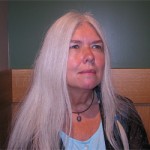Susan Deer Cloud, a Native American poet, will read from her newest collection of poetry “Braiding Starlight,” at 7 p.m. Thursday in Clarke Lounge.

Cloud is an acclaimed poet whose work has won awards and fellowships such as the National Endowment for the Arts Literature Fellowship, first place in the Allen Ginsberg Poetry Competition and Native American Woodcraft Circle Editor’s Award for multicultural anthology confluence.
Photo Editor Michelle Boulé spoke with Cloud about her newest collection of poetry involving love, death and transformation.
Michelle Boulé: What Native American tribe is your family from?
Susan Deer Cloud: I’m of Mohawk and Blackfeet and some Seneca lineage. And I am what is known as méti, I’m mixed blood as a lot of us in the Northeast are, or all over the country for that matter.
MB: Why did you decide to write poetry?
SC: I don’t think that I decided — I think I was born a writer actually. Because I have to tell you before I even went to kindergarten I knew that I was a writer.
MB: Even before you could write you knew you were a writer?
SC: Before I could write I used to tell stories, and my father used to take us for drives in the country, and we would sing songs, and when my family stopped singing songs I would make up songs or poems or stories and sing them. I’ve done a lot of thinking about that because of course people have suspicions about whether we are born with theses gifts or if we pick some of it up as we go along.
MB: When did you first start writing poetry?
SC: Very early on. I still have poems from when I was in seventh and eighth grade, and I have a story I wrote when I was in the sixth grade. I wrote them on lined tablet paper.
MB: Are there any subjects that you tend to gravitate towards in your writing?
SC: I work a lot with native themes, themes having to do with women. I’m a big place and spirit of place writer. My writing is political in certain ways; you could tie it in with that statement that personal is political, and I do regard myself as being a political writer. I think that other people do also, but I do it in a particular fashion. There are a lot of different things in my writing.
MB: How influential is your heritage in your work?
SC: It’s very influential — not just the native side. I’ve been very influenced by growing up in the Catskills, by mountains, people because some of my background is out of what I’ve always thought of as the northern part of Appalachia, that kind of independent mountain spirit and definitely very, very influenced by the natives because being of Indian background taught me to question what was in textbooks, movies and the media from very early on in my life. … I came more out of an era where people were still being shamed for being native, and certainly my mother talked to me about how Indian people were not always treated kindly. And then when I got older the American Indian movement came about and then the entire movement for native people to get more of their dignity and pride back. So all of that had a huge influence on me.
MB: What are some of the major themes or ideas in your newest collection of poetry “Braiding Starlight?”
SC: Some of the themes I just talked about. Some of them have to do with loss, with women, one has to do specifically with matters of abuse, friendship — one might say all of the themes a good writer deals with — love, death, transformation.
MB: How long does it take you to create a collection of poetry?
SC: I write a lot; I can write about a poem a day. People have remarked on how prolific I am, and I have another big collection of poetry coming. So it’s just a matter of pulling together the poems and putting them into some kind of arc of theme and meaning for the book that it is going to become.







